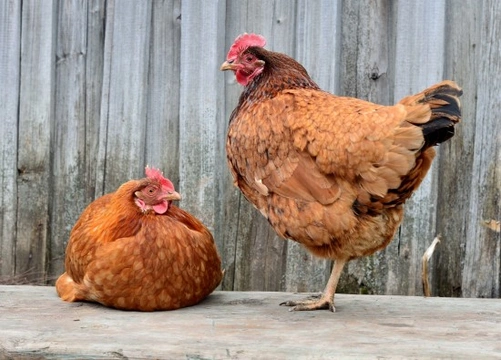
How to Recognise that a Hen Might be Egg Bound
If you keep poultry, you may have come across a hen looking a little sorry for herself and standing a little more erect than normal. This could be sign that she might be egg bound which is usually a sporadic occurrence in a small flock. Although a potentially serious condition, it can often be successfully treated if you pick up on the fact your hen is having trouble laying in time. If your hens often get egg bound and particularly if there’s a high mortality rate, then it would be worth calling in the vet because there may well be an underlying cause which needs sorting out.
Why Hens Become Egg Bound
It’s useful to have an idea of how an egg is produced in order to understand just how a hen might become egg bound. When a hen is mature and therefore laying, the ovary releases an ovum (the yolk) which enters the oviduct. On its way down the oviduct, the yolk is covered by layers of albumin (the egg white) and the shell is produced at the lower end of the oviduct just before the egg is laid. The whole process takes around 24 hours.
A hen is said to be egg bound when she is not able to lay an egg so it becomes impacted at the end of the oviduct or in the vent. Being egg bound is a potentially serious condition because if the egg can’t be passed then the hen will ultimately die. If the impacted egg breaks inside her then there is a risk of infection which again, may be fatal.
The Causes
The process of egg production is very complex and it’s no surprise that occasionally there are problems. The condition is seen in hens of all ages and it may simply be due to a very large egg (perhaps a double yolker) which is too big to pass through the vent although this is more likely to happen in young birds rather than older hens because they are not yet fully grown. Improperly formed eggs namely ones which have soft shells, may become impacted as the oviduct muscles have nothing firm to push against. Other reported causes include the following:
- Stress
- Calcium deficiency – calcium is essential for muscle contraction and the oviduct is a muscular organ designed to keep the egg moving
- Dehydration
- An underlying disease like a heavy worm burden
- Inflammation of the oviduct
- Poor nutrition – or too good nutrition – fat birds are prone to becoming egg bound
- Genetic factors
How to Spot if Your Hen is Egg Bound
When hens are unwell, they really don't act like their usual selves so it's quite easy to spot when one may be under the weather. However, when they are egg bound the signs of this being the case could include the following.
- Looking depressed
- Fluffed up feathers
- Not eating or drinking very much.
More specific clues might be that the hen spends a lot of time in the nest box but doesn’t lay anything. You might see her straining to pass the egg. Her abdomen might be swollen and in most cases you can feel the egg at the end of the oviduct. The vent might be red and swollen, and you may see droppings leaking from the vent.
The First Aid You Can Offer Your Hen
Some people recommend bathing the hen’s abdomen in a bowl of warm soapy water for about half an hour in order to relax the vent. Once you’ve done this, leave the hen in a warm place for an hour or two to see whether she can pass the egg. If she doesn’t lay you should try repeating the bathing process.
If there’s still no success and you can feel an egg at the end of the oviduct, then you could try to help the hen pass it. You may be able to insert a lubricated gloved finger into the cloaca alongside the egg to help carefully squeeze the egg out. Lubrication is very important and water based lubricants such as KY jelly are preferable to oil based products such as Vaseline although some people swear by olive oil. It’s easier to do this if you have a second person to hold the hen for you.
The All Important After-care
If you manage to remove the egg, the hen will be very sore and tired. She should be put in separate place away from the rest of the flock to recover because hens being hens may well start to peck at her vent causing her further injury.
If the cause of the impaction was due to an oversized egg, then the hen should make a good recovery. If, however, there is an underlying disease like an infection of the oviduct, the outlook is not so good. Infection can spread up the oviduct and into the peritoneal cavity leading to peritonitis and death.
When to Get Help
If the hen doesn’t pass the egg and you aren’t able to help her, then you’ll need to get help, preferably from a vet who has experience treating poultry. You should also seek attention if the egg breaks internally because there is a risk of damage to the oviduct which could then lead to a nasty infection. Your hen may need to be given oral electrolytes and calcium and/or vitamin D3, and possibly a calcium injection. Your vet may prescribe antibiotic treatment if he/she suspects oviduct infection to be a complication or possible underlying cause of the condition.



